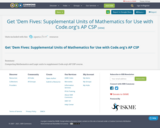
Computing Mathematics and Logic units to supplement Code.org's AP CSP course.
- Subject:
- Applied Science
- Computer Science
- Material Type:
- Assessment
- Lecture Notes
- Unit of Study
- Date Added:
- 03/06/2019

Computing Mathematics and Logic units to supplement Code.org's AP CSP course.
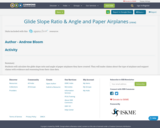
Students will calculate the glide slope ratio and angle of paper airplanes they have created. They will make claims about the type of airplane and support claims with evidence and reasoning from their class data.
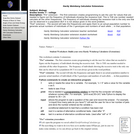
"Pre" extension - The first extension creates programming to ask the user for values that are needed to figure out the frequency of individuals showing the recessive trait. This is THE one number needed to calculate all the other frequencies. The frequency of individuals showing the recessive trait is the only one that can be observed in a population BUT it is not always given in the word problem.
"Post" extension - The second will take the frequencies and apply them to an actual population number to generate actual numbers of individuals of the 3 genotypes and numbers of each allele … in that population.
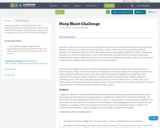
Design and engineer a mechanical device that is powered by hydraulic (syringe and water) that includes levers and moving parts that will propel a ping pong ball to complete the 2 levels of the “Hoop Shoot Challenge”.
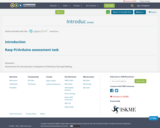
Assessment for Introduction to Raspberry Pi/Arduino through Making

6.0002 is the continuation of 6.0001 Introduction to Computer Science and Programming in Python and is intended for students with little or no programming experience. It aims to provide students with an understanding of the role computation can play in solving problems and to help students, regardless of their major, feel justifiably confident of their ability to write small programs that allow them to accomplish useful goals. The class uses the Python 3.5 programming language.
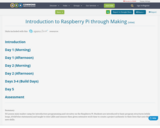
10 Lesson mini-maker camp for introductory programming and circuitry on the Raspberry Pi. Students are introduced to basic program structures (while loops, if/elif/else statements) and taught to wire LEDs and sensors then given extensive work time to create a project authentic to their lives that uses their new skills.
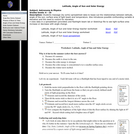
Students massage (by sorts) spreadsheet data to tease out the relationships between latitude, angle of the sun, surface area of light beam and temperature. Also introduces possible confounding variable of elevation and the need to control for elevation.
• Uses data in a spreadsheet (provided) and flashlight beam lab or Sketchup file to see light surface area increase or decrease with angle change.
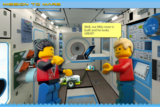
This teaching unit was created to provide any classroom teacher with all the tools necessary to help her students learn and apply engineering and design skills and computer science concepts in the context of a Next Generation Science Standards (NGSS) style investigation.
Students learn in the context of a story line that winds throughout each of the five workshops in the unit. Each workshop introduces a new phase of their ongoing “Mission to Mars.” Every workshop begins with a video that provides students an overview of the problem or situation encountered by the Mars Explorers (represented in the online modules by two Lego™ mini-figures and called Max and Mia to match the WeDo software). The curriculum then walks the students through a series of online learning modules that help them learn about a piece of technology or a new concept they’ll need to build a model from Lego WeDo™ kits and how they can solve real life problems using engineering practices.
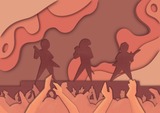
The "Music of the Future" is a lesson activity that combines STEAM/Maker Education, programming with Scratch, and MakeyMakey. This lesson activity aims to develop 21st-century skills, which are the basics of product design, block-based programming, electronic programming, and collaboration skills. Here, we present the overview of this lesson activity, the comprehensive lesson plan for the teachers, and instruction for the students.
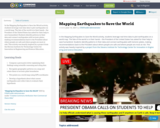
In the Mapping Earthquakes to Save the World activity, students leverage real-time data to plot earthquakes on a world map. The fate of the world is in their hands – the President of the United States has asked for their help to save humankind. Students identify patterns in their data and connect earthquakes with tectonic plates, making recommendations back to the President about where people are safe and where people are most at risk. This activity was heavily inspired by a project from the Stevens Institute for Technology Center for Innovation in Engineering and Science Education.
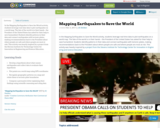
In the Mapping Earthquakes to Save the World activity, students leverage real-time data to plot earthquakes on a world map. The fate of the world is in their hands – the President of the United States has asked for their help to save humankind. Students identify patterns in their data and connect earthquakes with tectonic plates, making recommendations back to the President about where people are safe and where people are most at risk. This activity was heavily inspired by a project from the Stevens Institute for Technology Center for Innovation in Engineering and Science Education.
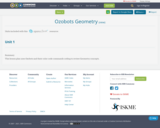
This lesson plan uses Ozobots and their color code commands coding to review Geometry concepts.
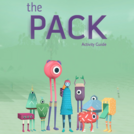
The Pack is a digital game that encourages learners to use Computational Thinking (CT) to solve problems they encounter in the futuristic world of Algos, where healthy ecosystems have faltered and water and food are scarce. Throughout the game, players must find food sources to attract their own Pack of Algos creatures. These creatures have various functions (like digging, moving, grabbing, and bumping) that can help the player collect seeds and bring water to dry areas. Creatures can be combined to form algorithms that perform complex tasks and overcome challenges. Players’ use of these algorithms is the key to finding all of the seeds and restoring harmony to Algos!
The Pack game and supplemental activities are designed to support middle schoolers in engaging with Computational Thinking concepts and practices while reinforcing basic scientific reasoning. The supplemental activities encourage players to reflect on their gameplay through the lens of Computational Thinking and to explore how solving problems in the game connects to the ways they can solve problems in class and beyond. The supplemental activities can be implemented in a classroom, as part of an after-school program, or even as an activity for families to do together at home.
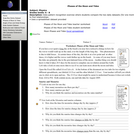
Data pattern recognition exercise where students compare the two daily datasets (for one month) to find relationships.

Meet ROBO!As a simple, environment and design-friendly robot, ROBO is your hub to create, contribute, and learn through fun and unique activities. From simple self-regulated learning prompts to simple programming to making your own block-based or JavaScript code to personalise this robotic woody friend, ROBO focus on supporting your learning experience and learner progression. This manual will give you everything you need to get started!Learning Objectives:I know what ROBO can doI can play with ROBOI can use ROBO to set a timer to learn, take a break, and motivate myselfI can remix some of ROBO functions
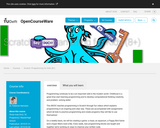
Programming continues to be a an important skill in the modern world. Childhood is a great time start learning programming and to develop computational thinking creativity, and problem- solving skills!
This course teaches programming in Scratch through fun videos which explains programming in an inspiring and clear way. These are accompanied with assignments which let kids to practice programming and create programs they will like to use themselves!
On a weekly basis, we will be creating a game: a maze, an aquarium, a Flappy Bird Game and a Super Mario look-a-like. Every week, new programming blocks are taught and together we’re working on ways to improve your written code.
This course is an English version of a course that was used in primary schools in The Netherlands with great success. The material follows the educational curriculum for programming in primary education of The Netherlands.
Do you want to participate with more children? Create a personal account for every child or pupil in order for them to work at their own pace. Once they have fulfilled the entire course and were upgraded to the ID Verified track, a Scratch diploma with their names will be handed out.
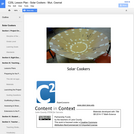
In this project students will research and then build a basic solar cooker shell made out of cardboard. Then they will run a variety of materials through experiments. Data from the experiments will be used to determine which materials should be added to the solar cooker shell to improve its ability to heat up food.
This project was created as a collaboration between a science and an engineering/woodshop class. The engineering class researched and build the basic solar cooker cardboard shells. The science class tested additional materials to add to the shells to improve the solar cookers. Then the engineering class, following the directions from reports created by the science class, added the materials to the solar cooker shells to create the final products.
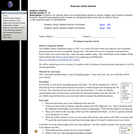
Students roll vehicles down and inclined plane placed at various heights and measure distance traveled. Recorded and graphed data reveals an unexpected data trend (due to friction force).
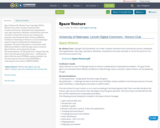
Space Venture
By: Mickey Tran Copyright 2018 by Mickey Tran under Creative Commons Non-Commercial License. Individuals and organizations may copy, reproduce, distribute, and perform this work and alter or remix this work for non-commercial purposes only.
Download: Space Venture.pdfDelete
Facilitator’s Guide
Space Venture is a set of challenges based on famous mathematical computational problems. The goal of this game is to introduce these different problems to kids through various scenarios. Space Venture can be played by all ages.
Recommendations:
1st-5th grade level : simply allow the kids to play the game
6th grade level + : challenge the kids to find the most OPTIMAL solution whether it be the least amount of moves when SHIPPING or collecting the most items in EARTH SHELF.